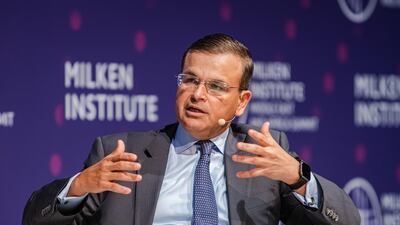Saudi Arabia's economic diversification push, the financing of new infrastructure projects and the requirement for investment into digital technologies will drive growth for Standard Chartered in the region over the next decade.
Sunil Kaushal, the UK bank's chief executive for Africa and the Middle East, said it would play to its strength in terms of "bringing overseas capital in different forms and different structures to the right projects and for the right entities".
The increased role of the private sector as a result of the opening up of the Saudi economy is a “win-win” for Standard Chartered, which has traditionally been strong in emerging markets.
“We see ourselves as being the bridge for foreign capital to come in and support and build and grow with the Saudi story, the Vision 2030,” he said.
A year ago the bank received approval from the kingdom’s regulators to start operations there, filling a critical gap in its regional network.
"We are in the process of now implementing on that licence. Saudi authorities have been fantastic, very, very co-operative, very proactive, we've got all the support from them. It is a big change from what things were in the past," he said, speaking to The National during the World Economic Forum annual meeting in Davos, Switzerland.
Mr Kaushal expects the bank to have “fairly healthy growth across the region”.
“Our focus will be on infrastructure and project finance — that’s a big element of it,” he said.
Over the next decade “you are going to see a lot of privatisation happening, linked to the diversification and the demand for capital will remain solid”.
The digital push will require investment, as will a greater emphasis on sustainability and achieving the UN sustainable development goals, Mr Kaushal said.
“That’s going to be massive in terms of doing the right thing but also finding the right projects where this capital can come in. Renewables, clean energy, industrialisation, innovation, mobility [and] digitalisation.
“There is a massive demand, there is huge capital but you’ve got to do it in a sustainable manner. That’s very important because that is where the demand is for the future, you can’t do it in a traditional way.”
However, there remains the risk of the impact of continuing geopolitical tensions in the region. In major markets like the US or China, “if there is a really sharp slowdown [we may] recalibrate some of our plans”.
“Right now we don’t see that risk. We don’t see a risk of recession,” he said.
The high level of debt that has been taken on by emerging market sovereigns and at the corporate level is also something to monitor.
“If there is a big shift in sentiment that can have a cascading impact,” he said, although underlining that the bank's outlook is optimistic.
“We are in some of the most exciting markets. We are very well positioned to really achieve whatever is left in terms of our strategic turnaround. It is very disciplined. It is a quality and very disciplined growth.”
In October, Standard Chartered reported a 3 per cent increase in net profit for the three months to September 30 to $772 million (Dh2.84 billion) as net interest income grew 9 per cent to $2.39bn. Operating income from its Africa and Middle East arm grew 2 per cent, or 8 per cent on a constant currency basis, supported by double-digit growth in its financial markets division.


